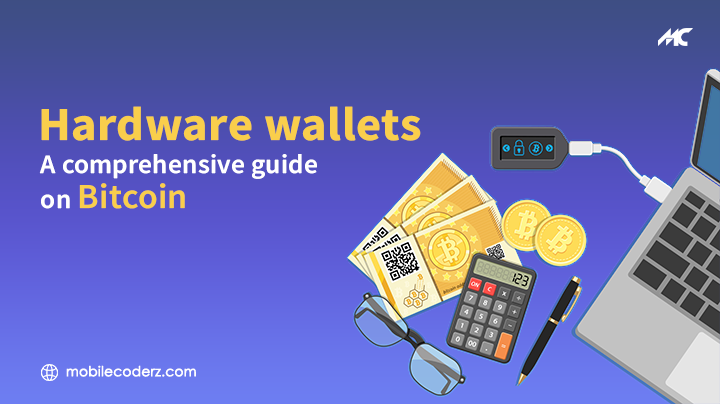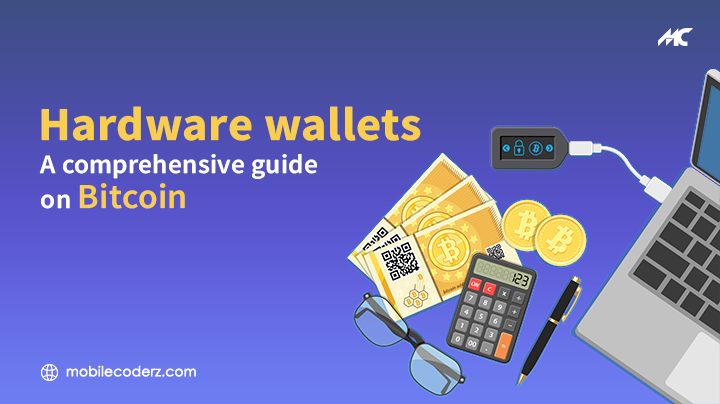Hardware Wallets: A Comprehensive Guide on Bitcoin
In the year 2018, when the cost of bitcoin made a record-breaking drop of around $20,000 to under $6,000, many individuals thought the cryptocurrencies would be vanishing. However, today, the market of cryptocurrency is on another tremendous bull run, with the cost of bitcoin drifting above $50,000 and other digital currencies remaining at memorable records.
Generally, the cost of Bitcoin elevating to a higher level like anything, the cost comes with an influx for new lovers. It would be best for those who would prefer not to pass up on the chance of the next spike in the estimation of cryptocurrencies.
Tragically, a significant number of these individuals are plunging head-first into the market. A large number of individuals have fallen prey to hackers. It is their own errors that have led to a loss in the holding of their saving on cryptocurrency.
Earlier when bitcoin was launched, there was an unmistakable compromise between wallet convenience and security. It was not at all easy to use. However, nowadays, the market of wallets with bitcoin hardware has totally matured. It will have numerous choices that offer ownership, security, and convenience simultaneously.
If you do not have any idea about bitcoin, here is what you need to know about it, how it works, and why you should consider it.
So, how does this hardware wallet work?
One of the primary attractions of cryptocurrencies is that they are decentralized cash. It is similar to owning/ carrying cash in your wallet. There is no focal authority such as a bank or any other monetary institution that will handle your cash.
To get rid of central authorities, cryptocurrency employs Blockchains to record the transactions. You can term Blockchain as a ledger. It updates and stores the data on a large number of autonomous PCs all across the globe. Even though the validation mechanism may vary between Blockchains and different cryptocurrencies, they employ cryptography. This cryptography ensures that the transactions are totally legit or cannot be tampered with.
For instance, when individuals want to transfer bitcoins, they will utilize a specific bitcoin address. This will be a unique line of alphanumeric characters. Each affirmed payment is combined to Blockchain and will be enclosed with the sender’s address and information about the receiver who will receive the transaction.
How to prove the address stored on bitcoins belongs to you? Each address of the bitcoin is related to private and public cryptographic keys.
Private/ Public cryptography is the encryption of an old mechanism that is still employed to date. Now this includes PGP-secured emails and HTTPS websites.
An individual can publish the public key so that others can send them as well as encrypt confidential data. They can keep the private key with themselves and use it to unravel the information encoded with their public key.
The opposite is additionally evident: Data encoded with a private key must be decoded with the public key. It is used for “digital signatures.” To demonstrate that you are a genuine sender of the snippet of data, you can add the snippet of data encrypted with the private key. Since the public key would already be known, anybody can approve the signature by attempting to decode it with the public key.
Let’s move back to understand Bitcoin transactions. Suppose if you have to transfer the bitcoins, you need to prove that you own them. For this, you must first sign the transaction using the sender’s address. You must ensure to use the private key of the sender. Once this stage is verified, the system that is maintaining the Bitcoin Blockchain will give the approval so that you register the transaction.
What is a Bitcoin Wallet?
This carries us to the central issue about bitcoin proprietorship: Whoever has the holding of the private key of the address possesses the bitcoins stored at this specific address.
Working of Bitcoin Wallet
This wallet essentially stores the address to the private and public to at least one or more bitcoin addresses.
The different types of wallets are mentioned below:-
-
Online Wallets
It is an app or a website that stores your bitcoin keys on a server.
-
Software Wallets
Software wallets are apps you introduce on your PC or cell phone. They store your bitcoin keys on a flash drive or a local drive.
-
Paper Wallets
Paper wallets are truly printed adaptations of your public and private keys. Paper wallets as a rule additionally contain QR codes of the keys to make it simple to utilize them.
How can you store your private keys and decide the security of your bitcoin reserves? What’s more, each sort of bitcoin wallet has its advantages and tradeoffs.
-
Hardware Wallets
This wallet will store the information on your bitcoin keys. It is part of the hardware that was definitely outlined for the transaction of bitcoin.
The tradeoffs and advantages of various bitcoin wallets
There is normally a tradeoff between convenience and security in various sorts of bitcoin wallets. For example, online wallets are simpler to use than different kinds of wallets. You can get to them from a program from any device for as far long as you can recall your password and username.
Also, they have a lot of good highlights, for example, rapidly purchasing, trading cryptocurrencies, and selling. In any case, it stores the private keys on the server that is central. It further makes them somewhat similar to banks. It holds the keys to your bitcoin and, as it were, you’re surrendering your protection and the responsibility for bitcoins.
Additionally, in the event, if somebody falls prey to a phishing attack, an aggressor will actually access the wallet and steal the bitcoins because the key (private) is saved online. Online wallet organizations nowadays are leaving no stones unturned to keep the account secure. However, they infrequently get hit by data breaches, where the hackers can easily steal the cryptocurrencies as well as the private key of the user.
Software wallets can easily be installed on any sort of gadget/device. You get the privilege to keep your privacy and private keys. Without having your keys put away or stored in the cloud, the hackers can’t fool you into parting with your username and password (however they can in any case fool you into making payments to their bitcoin address).
The security of these wallets is additionally complicated. In the event that your gadget gets hacked with malware, an attacker could possibly take your private key. Furthermore, if your gadget gets annihilated or lost, you may lose bitcoins.
Hardware wallets have a related desktop, mobile, or web, portable, that empowers you to screen your bitcoin addresses and spend bitcoins. Private keys will never leave the device or stored on the wallets of hardware.
At the point when you need to affirm the payment, the transactions are endorsed inside the hardware wallet and the yield is shipped off the application. Hardware wallets are safer than different choices since they are exceptionally difficult to hack.
Yet, they don’t have the adaptability of online wallets since you need to have your device/ gadget with you for each transaction. Also, similar to software wallets, on and off chance if you lose your device, forget to recall your PIN code, or fail to remember your recovery seed, your bitcoins are gone.
Pranay Aggarwal, Co-founder and Chief Operating Officer at MobileCoderz, shares that Blockchain has added new dimensions to various niches such as the banking industry, aviation industry, travel industry, etc. This innovation can easily integrate the functionalities, practicality, and performance in one place.
-

 Mobilecoderz Awarded as India’s Best iPhone App Development Company by Clutch
Mobilecoderz Awarded as India’s Best iPhone App Development Company by Clutch -

 How Much Does It Cost to Develop a SaaS Application?
How Much Does It Cost to Develop a SaaS Application? -

 Mobilecoderz recognized as the Top App Development Company in Saudi Arabia by GoodFirms
Mobilecoderz recognized as the Top App Development Company in Saudi Arabia by GoodFirms














